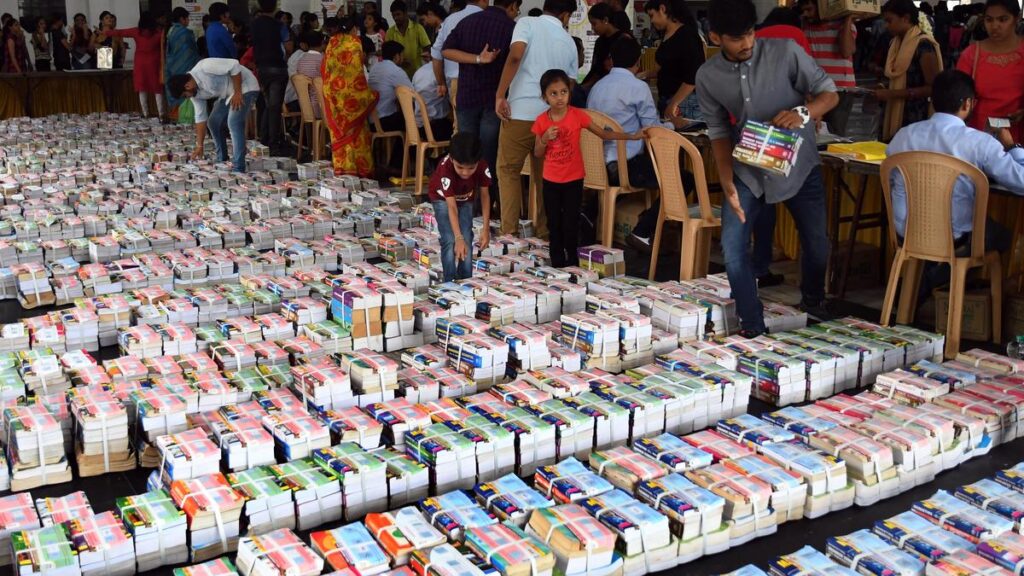
A file photo of an annual book distribution by RYA Book Bank.
If you popped by ryabookbank.com now, you would notice the home-page header has relinquished its top slot, offering it magnanimously to a tangerine-coloured panel. It is the season (one returning every year) when this transfer of power happens. Ensconced at the top, the panel “hollers” at you: “RYA Book Registration Open. New Application Registration Open from 12-05-2025.”
The announcement ends with a blinking imperative, one demanding a click of the mouse: the hyperlink leads you to a page where old members can check in with their credentials, and to-be members start the registration process with the Rajasthan Youth Association (RYA) Book Bank.
The student can check off the course and the year for which registrations are open. Proceeding infield, the student has to provide a wide range of details, the highlights being Aadhar card and 12th mark certificate and college details to establish the registrant is a bona fide college student seeking textbooks on loan. By the time they wrap up the process — either registering a new member or an old member looking for new textbooks — they have an inkling of what made RYA Book Bank a synonym for cost-free lending of college textbooks in the Chennai Metropolitan Area. Beyond the Rajasthani community’s commitment to social responsibility and the dedication of the book bank team, there is a clear and undeniable element — digitalisation of mundane processes.
Technology has reduced the workload on the team at RYA Book Bank, which largely consists of volunteers whose time is a freewill gift, and cannot be coaxed out of them, even less demanded.
Casting his mind back to the time when a truckload of processes were carried out manually, Raj Kumar Dugar, past chairman of RYA Book Bank, presents the contrast ushered in by technology: “Students’ records are now better maintained, and caution deposit payments (just ₹ 500) have become more convenient. Earlier, payments were made in cash at the office, which was difficult when staff were unavailable. Now, all transactions are processed smoothly through banking channels, eliminating cash handling.”
Non-profits struggle with marshalling human resources, and RYA Book bank has demonstrated how technology brings a shedload of invisible hands to the deck. Interactions between the staff and students happen more online than at Atkinson Street in Vepery, where RYA Book Bank is located.
RYA Book bank has impressive numbers to bear this out — be it the number of colleges, beneficiary-students or the textbooks distributed — and much of it was racked up in the last 10-12 years through digital processes.
On the e-registration form, the dropbox for colleges seems to list every college in the Greater Chennai, Kancheepuram and Chengalpattu districts, displaying RYA Book Bank’s immense reach.
The years behind RYA Book Bank, born in 1963 — do the math and know the distance of this charity run. At any given time, more than 9,000 students are in possession of books provided by the project, says Raj Kumar. He continues: more than 1.45 lakh students have benefited from the project since its inception, and each year, over 1,500 sets of books are distributed.
Initially, the book bank built the girth of its books inventory by collecting old textbooks from outgoing students, and as this approach was riddled with “if’s” (the major ‘if’ having to do with the willingness of the students who have bought textbooks from the market to part with them), the switch was made to purchasing new textbooks under various disciplines and loaning, collecting and reloaning them till the book displays the effects of age and sustained use and, of course, slips out of the curriculum on account of a syllabus rethink.
Donors are encouraged to support the initiative in any of two ways: Gyan Deep (a donation of ₹11,000 to cover the textbook costs for the entire course of a student in the arts, science and commerce streams) and Vidya Deep (a donation of ₹21,000 for a deserving engineering student for the entire eighth semester).
On the future trajectory of this RYA Book Bank, Raj Kumar notes the project is considering the integration of e-books into its offerings. He is quick to qualify it: “However, it presents certain challenges, especially since students still prefer reading from physical books. The effectiveness of building a robust e-book section is yet to be determined.”
For this year, RYA Book Bank registrations close on August 31, 2025.
Published – June 01, 2025 05:07 pm IST
Source:https://www.thehindu.com/news/cities/chennai/as-a-new-academic-year-is-set-to-begin-an-invitation-to-another-wave-of-college-students/article69645129.ece

